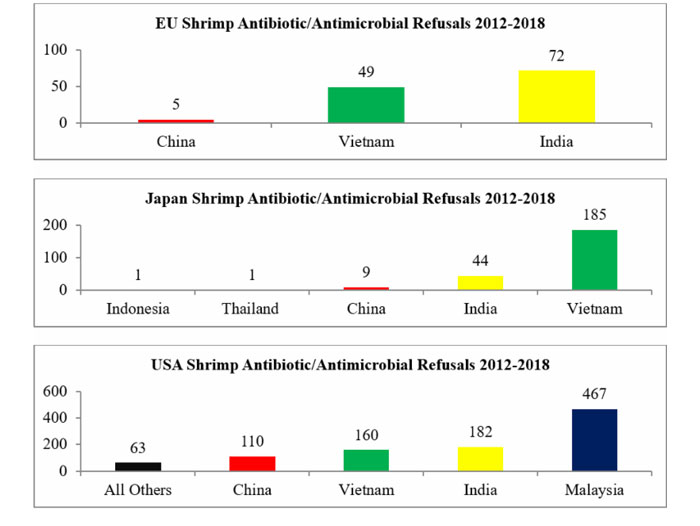Southern Shrimp Alliance Releases Updated Databases Documenting Antibiotic-Contaminated Shrimp Import Rejections
April 10, 2019 | 3 min to read

As part of its “Know Your Supplier” initiative, the Southern Shrimp Alliance today released updated databases providing detailed information regarding shrimp imports rejected from the European Union, Japan, and the United States because of the presence of banned antibiotics.
The databases, made available in Excel format, now include information for calendar year 2018 for the actions taken by enforcement agencies in the three major shrimp import markets in the world.
The database of information from Japan’s Ministry of Health, Labour and Welfare, Imported Foods Inspection Services (IFIS)compiles information regarding shrimp imports rejected because of banned antibiotics between November 2010 and 2018. IFIS reported refusing twenty (20) shipments of shrimp because of the presence of banned antibiotics last year, all originating either from Vietnam (16) or India (4).
The database of the European Union’s Rapid Alert System for Food and Feed (RASFF) notices compiles information regarding every alert regarding shrimp imports found to contain banned antibiotics between 2001 and 2018. Last year, RASFF included another fourteen (14) notices of shrimp refused entry into the European Union because of banned antibiotics. All but one of these refusals was of shrimp shipped to Europe from India.
The database of U.S. Food and Drug Administration’s (FDA) entry line refusals compiles information regarding every shrimp entry line refused for reasons related to banned antibiotics between 2002 and 2018. Last year, the FDA refused fifty-three (53) entry lines of shrimp because of antibiotics, of which twenty-three (23) were from China and fifteen (15) were from India.
The Southern Shrimp Alliance is providing this updated information in order to enhance the ability of consumers, importers, wholesalers, retailers, and restaurants to evaluate the risk of exposure to contaminated shrimp from various sources. As these data confirm, findings of problems are overwhelmingly concentrated in only a small number of countries that engage in shrimp aquaculture. And even within these countries, only a limited number of shrimp packers and shippers have failed to take action to prevent contaminated shrimp from being marketed.
As the charts below demonstrate, over the last seven years, RASFF notifications regarding shrimp contaminated by antibiotics have been dominated by imports sourced from India and Vietnam. Over the same time period, the vast majority of imported shrimp rejections in Japan because of the presence of banned antibiotics have been of products sourced from Vietnam and India. For the United States, other than the hundreds of refusals for Malaysian shrimp that was likely transshipped Chinese shrimp, the second and third largest sources of refusals were India and Vietnam.
About the Southern Shrimp Alliance
The Southern Shrimp Alliance (SSA) is an organization of shrimp fishermen, shrimp processors, and other members of the domestic industry in the eight warmwater shrimp producing states of Alabama, Florida, Georgia, Louisiana, Mississippi, North Carolina, South Carolina, and Texas.
